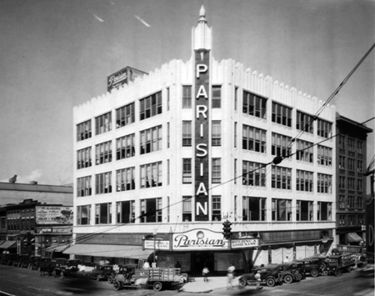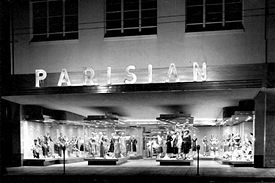Parisian: Difference between revisions
No edit summary |
|||
| Line 3: | Line 3: | ||
==History== | ==History== | ||
[[Image:Parisian 1920s.jpg|left|thumb|375px|Parisian's 3rd Avenue flagship in the 1920s]] | |||
The original Parisian store was founded in [[1880]] by sisters Bertha and Estella Sommers under the name '''Parisian Dry Goods & Millinery Company'''. The Sommers sisters moved the store three times and sold it in [[1911]] to [[Louis Gelders]] and [[G. W. Beringer]], who renamed it '''The Parisian Company'''. [[Lauren Bloch]], the store's general manager, bought it in [[1918]] and renamed in '''Bloch's Parisian'''. | The original Parisian store was founded in [[1880]] by sisters Bertha and Estella Sommers under the name '''Parisian Dry Goods & Millinery Company'''. The Sommers sisters moved the store three times and sold it in [[1911]] to [[Louis Gelders]] and [[G. W. Beringer]], who renamed it '''The Parisian Company'''. [[Lauren Bloch]], the store's general manager, bought it in [[1918]] and renamed in '''Bloch's Parisian'''. | ||
[[Carl Hess]], a German immigrant, and [[William Holiner]] bought the store in the early 1920s and moved it to a [[ | [[Carl Hess]], a German immigrant, and [[William Holiner]] bought the store in the early 1920s and moved it to a [[The Parisian|large building]] on the corner of [[3rd Avenue North]] and [[18th Street North|18th Street]] in Birmingham in [[1928]]. The [[Great Depression]] pushed the company into receivership and near demise in [[1932]]. | ||
===1937 store=== | ===1937 store=== | ||
Revision as of 10:13, 1 September 2013
Parisian was a chain of department stores, founded in Birmingham in 1887 and sold by Birmingham-based Saks, Inc. to Belk Inc. of Charlotte, North Carolina in 2006.
History
The original Parisian store was founded in 1880 by sisters Bertha and Estella Sommers under the name Parisian Dry Goods & Millinery Company. The Sommers sisters moved the store three times and sold it in 1911 to Louis Gelders and G. W. Beringer, who renamed it The Parisian Company. Lauren Bloch, the store's general manager, bought it in 1918 and renamed in Bloch's Parisian.
Carl Hess, a German immigrant, and William Holiner bought the store in the early 1920s and moved it to a large building on the corner of 3rd Avenue North and 18th Street in Birmingham in 1928. The Great Depression pushed the company into receivership and near demise in 1932.
1937 store
The store moved into the remodeled Roden Block on 2nd Avenue North in 1937 and this remained the flagship store until 1989. The business eventually emerged from receivership and grew in the 1940s and 1950s under the management of Carl's son Emil. In October 1950 the store received a major renovation that included excavation of a storage basement and a mezzanine-level men's store. The new entrance, clad in plate glass and Alabama marble, featured the nation's first installation of "Pittcomatic" touch-action hydraulically-operated doors, as well as backlit plexi-glass and neon signage.
Hess and Lenny Salit (son-in-law of William Holiner) developed a popular interest-free credit program in the 1950s, and the store was one of the first in the country to offer free gift wrapping, free shipping and a liberal return policy.
Suburban expansion
Parisian opened a second store at Five Points West in 1963. Though expectation were low, their early foray into the suburbs was an immediate hit. The company opened a third store in Vestavia Hills in 1965 and the fourth, at Eastwood Mall, in 1969.
For many years the company's corporate offices and warehouse were located in a former Dolly Madison bakery adjacent to the railroad tracks at 26th Street and 11th Avenue North.
In the 1970s, Parisian added stores in Huntsville, Montgomery and Florence. Parisian's owners took the company public in 1983, raising $22.5 million for expansion. Parisian anchored major mall developments, including Bel Air Mall in Mobile and Madison Square Mall in Huntsville, both of which opened in 1984. A second offering in 1986 raised an additional $18 million, allowing the chain to expand into Dothan, Pensacola, Chattanooga and Atlanta. Beginning in 1988, Jon Coffelt was commissioned to paint over 100 original works for Parisian by store designer Jim Mitchell, helping launch the artist's career.
Hooker Company, an Australian investor, bought Parisian in 1988 for $250 million and pledged $125 for an aggressive store expansion. Hooker filed for bankruptcy during the late 1980s economic downturn. Donald Hess, who had taken over operations from father, Emil, bought the chain Parisian back and — heavy with debt — sold a 45% interest to Lehman Brothers in 1990, which injected $35 million into the company. Parisian opened nine new stores 1992 and opened five more stores in 1993, stretching its footprint into Detroit and Nashville.
Proffitt's and Saks
Parisian joined Proffitt's Inc., in 1996. In September of 1998, Proffitt’s, Inc. and Saks Holdings, Inc. completed a merger transaction where Saks Fifth Avenue and its Off 5th outlet stores became the Saks Fifth Avenue Enterprises division of Proffitt’s, Inc. At that time, Proffitt’s, Inc. was renamed Saks, Inc.
At its height, Saks, Inc. operated more than 250 mid-level to high end department stores under its Saks Fifth Avenue Enterprises group, the Parisian division, the Northern Department Store Group (Younkers, Herberger's, Carson Pirie Scott, Bergner's, Boston Store), and its Southern Department Store Group (Proffitt's and McRae's), plus more than 50 Club Libby Lu specialty shops. The Proffitt's and McRae's stores were sold in 2005 to Belk, Inc of Charlotte, North Carolina.
In 2006, Saks' Parisian division, headed by President and CEO Toni Browning, operated 38 stores in Alabama, Florida, Georgia, Indiana, Michigan, Missouri, Ohio, South Carolina, and Tennessee. Particularly in larger markets, Parisian was placed in a marketing tier between the luxury-oriented Saks chain and the company's other more moderate nameplates.
Belk sale
In August 2006, Saks announced that Belk would purchase its Parisian division for $285 million, including all 38 stores, a 125,000 square foot distribution center on Lakeshore Parkway, and a 180,000 square foot distribution center in Steele. Belk closed the distribution center in Steele and converted all the stores to the "Belk's" nameplate in 2007, closing stores in some locations where both were represented.
When the sale to Belk was announced, Bayer Retail filed a lawsuit to block the change in the location at the Summit. Their primary claim was that Belk did not fit the lease agreement as a "first-class" shopping center. Both companies settled in April 2007 when Belk announced plans to make the Summit location a flagship store. [1]
Parisian Locations in 2006
- Alabama
- Birmingham - AmSouth-Harbert Plaza (flagship), Summit
- Homewood - Brookwood Village
- Hoover - Riverchase Galleria
- Trussville - Pinnacle at Tutwiler Farm
- Decatur - Colonial Mall Decatur
- Dothan - Wiregrass Commons
- Florence - Regency Square
- Gadsden - Gadsden Mall (formerly McRae's)
- Huntsville - Madison Square, Parkway Place
- Mobile - Bel Air Mall
- Montgomery - Eastdale Mall
- Tuscaloosa - University Mall (formerly McRae's)
- Arkansas (2 locations)
- Florida (3 locations)
- Georgia (9 locations)
- Indiana (2 locations)
- Michigan (3 locations)
- Mississippi (2 locations)
- Ohio (2 locations)
- South Carolina (2 locations)
- Tennessee (4 locations)
Former locations
- Birmingham - 3rd Avenue North (1928–1937)
- Birmingham - 2nd Avenue North (1937–1989)
- Birmingham - Western Hills Mall - (129,000 SF, closed March 2005)
- Birmingham - Eastwood Mall (1969-January 2005, 130,000 SF)
- Birmingham - Five Points West (closed July 1999)
- Montgomery - Montgomery Mall (closed March 2006)
- Cincinnati, Ohio - Beechmont Mall (closed July 1999), and Forest Fair (closed June 1998)
- Columbia, South Carolina - Columbiana Centre (95,000 SF, closed February 2006)
- Greenville, South Carolina - Greenville Mall (120,000 SF, became Proffitt's in 1999; closed in 2004)
References
- "Parisian's downtown store unveils remodeled 'face'". (October 1950) Birmingham News - via Birmingham Rewound
- Hollis, Tim (2005) Birmingham's Theater and Retail District. Images of America series. Charleston, SC: Arcadia Publishing. ISBN 0738517771
- "Saks sells Parisian to Belk for $285M." (August 2, 2006) Birmingham Business Journal
- Goodman, Sherri C. (April 25, 2007) "Summit Belk to become flagship." Birmingham News
- "Parisian." (June 23, 2008). Wikipedia, The Free Encyclopedia. Wikimedia Foundation, Inc. Accessed June 25, 2008.
- Derdak, Thomas. (n. d.) "Parisian, Inc." Answers.com Business & Finance.
External links
- Parisian website
- Saks, Inc. corporate website


